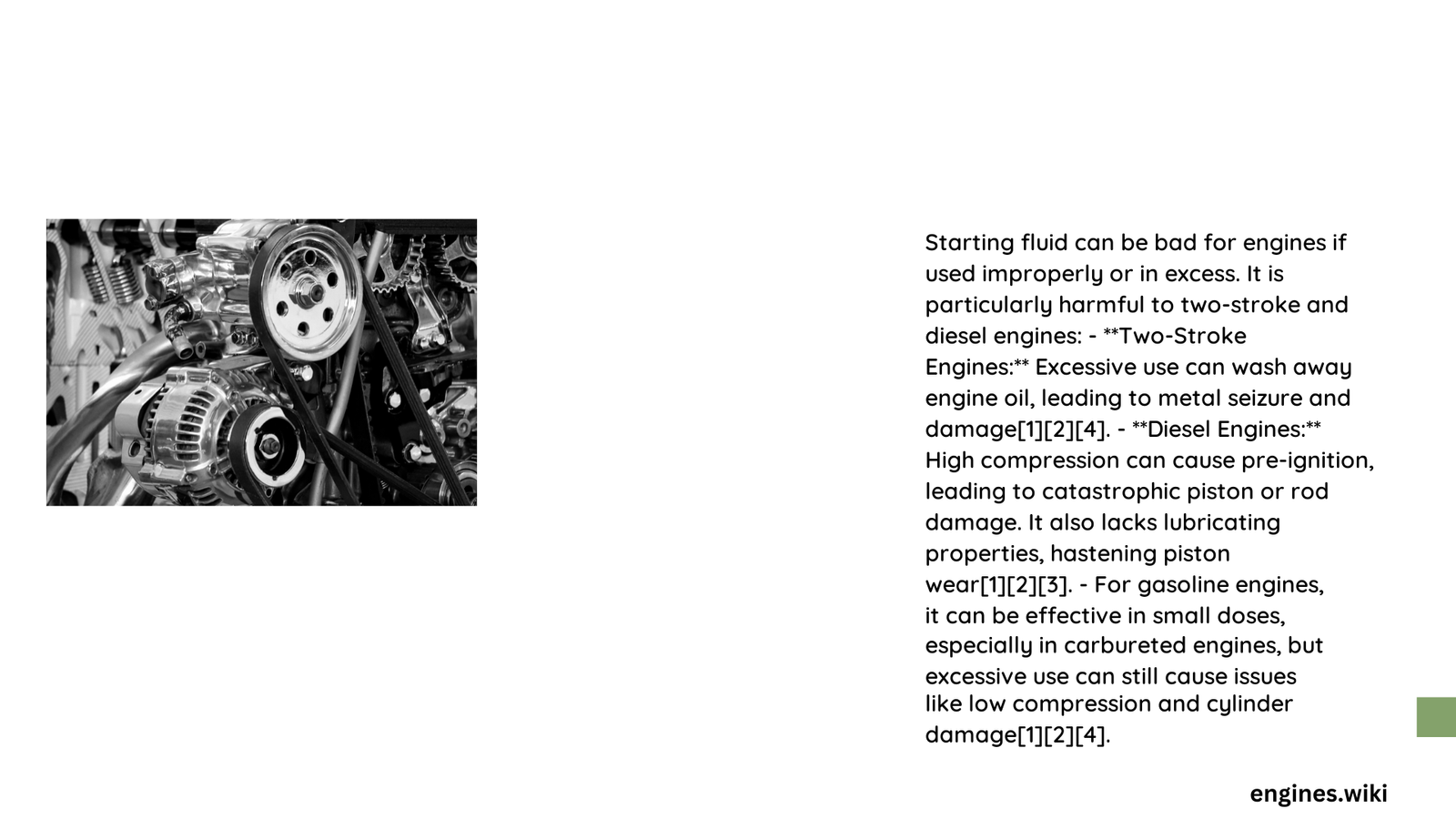Starter fluid, a volatile chemical solution primarily composed of diethyl ether, poses significant risks to engine components across gasoline and diesel platforms. While seemingly helpful in cold-start scenarios, its aggressive solvent properties can rapidly deteriorate critical engine parts, potentially causing catastrophic damage through oil film removal, premature ignition, and mechanical stress. Understanding its complex interactions with engine systems is crucial for preventing costly repairs and maintaining long-term vehicle performance.
What Makes Starter Fluid Potentially Dangerous?
Chemical Composition and Immediate Risks
Starter fluid contains highly volatile compounds that can dramatically impact engine functionality:
| Chemical Component | Potential Engine Impact |
|---|---|
| Diethyl Ether | Rapid, unpredictable combustion |
| Light Petroleum Distillates | Aggressive solvent action |
| Top Oil | Temporary lubrication disruption |
Mechanical Vulnerability Zones
- Cylinder Wall Interactions
- Removes critical protective oil film
- Increases metal-to-metal contact risk
-
Accelerates wear on piston rings
-
Combustion Chamber Dynamics
- Triggers premature detonation
- Creates uncontrolled pressure spikes
- Potentially damages connecting rods
How Does Starter Fluid Affect Different Engine Types?
Gasoline Engine Considerations
Gasoline engines exhibit different vulnerability levels compared to diesel counterparts:
- Carbureted Engines
- More susceptible to solvent damage
- Higher risk of compression loss
-
Potential for immediate performance degradation
-
Fuel-Injected Systems
- Slightly more resistant
- Still vulnerable to chemical breakdown
- Requires extremely cautious application
Diesel Engine Critical Concerns
Diesel engines represent the most significant risk zone for starter fluid usage:
- Extremely high compression ratios
- Greater potential for catastrophic component failure
- Risk of permanent glow plug and intake system damage
Recommended Safe Practices
Starter Fluid Application Guidelines:
– Use absolute minimum quantity
– Apply only in extreme cold conditions
– Avoid repeated applications
– Never use near glow plugs
– Prioritize proper maintenance over chemical shortcuts
Potential Repair Costs from Misuse
Starter fluid damage can lead to extensive repairs:
| Damage Level | Estimated Repair Cost |
|---|---|
| Minor Wear | $500 – $1,500 |
| Moderate Damage | $1,500 – $4,000 |
| Catastrophic Failure | $4,000 – $10,000+ |
Expert Recommendations

Professional mechanics universally recommend:
– Addressing underlying starting issues
– Maintaining proper battery and electrical systems
– Using block heaters in cold environments
– Performing regular engine maintenance
Alternative Cold-Start Solutions
- Battery maintenance
- Engine block heaters
- High-quality winter-grade oil
- Proper fuel system care
Final Technical Assessment
While starter fluid offers temporary starting assistance, its potential for causing long-term engine damage far outweighs momentary benefits. Systematic, preventative maintenance remains the most reliable approach to ensuring consistent engine performance.
Caution: Professional Consultation Advised
Always consult your vehicle’s manufacturer guidelines and a certified mechanic before attempting any unconventional starting procedures.
References:
– AMSOIL Technical Blog
– Automotive Repair Forums
– SAE Technical Papers
